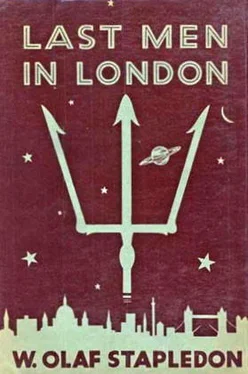1. PAUL AND HIS NEPTUNIAN PARASITE
WHY do I choose Paul for study? Why do I propose to tell you more of him than of anyone else in my collection? I have examined in detail at one time and another an immense number of specimens of your kind, not only your contemporaries but many others whose date is earlier than yours, and many who in your day are still to live. I have made myself familiar with every trait and whim, every minute episode in the minds of selected individuals from among the Greeks, the Indians, the early Teutons, the ancient Egyptians, the Chinese of all China’s phases, and also the still unborn Americans and Patagonians. In fact, there is no race of the First Men that has not yielded me samples; which, as I have grown intimate with them, have so captivated me with their fantastic personalities that I have come to regard them not merely as specimens but, in a manner, as friends. For these beings have yielded me the secrets of their nature to an extent impossible in normal intercourse; and yet they have never communicated with me, and for the most part have never suspected my existence.
If I chose, I could tell you many strange secrets about your famous characters, for instance about your Queen Elizabeth, who is among my collection. Through her eyes I have looked not only on the fair face of Essex, but also on that abnormal formation of her own body which caused her to be so lonely, so insistent on her womanhood, and withal so kingly. And I have tasted her bitter rage against fate, her greedy self-love, her love of England. Leonardo da Vinci also I have inhabited. It was I that tormented him with a thousand ideas in advance of his age. It was the enigma of my influence in him that he embodied in pigment as a smile. Aknahton also I swayed, and in his wife’s face my influence conjured another smile. There are moments in my life on Neptune when my beloved specimens crowd in upon my memory and overwhelm me with the infinity of their uniquenesses; when, forgetful of my own Neptunian personality, I seem to be nothing but the theatre in which these many play their parts.
If it is incredible to you that I should have millions of these intimates, remember, not only that the minds of the Last Men are far more agile and far more capacious than your minds, but also that I have spent many thousands of years upon the work, and that in most cases a whole terrestrial lifetime occupies me for no more than a day of my life on Neptune. Of course even my millions of specimens can afford only partial knowledge of your kind. But those of my colleagues who have been working in the same field have worked with no less industry. No doubt all of us together have studied only a minute fraction of your species; but at least we have by now sampled every culture, every local strain, every generation. And your own age, since it is the turning-point of your history, we have sifted again and again with special care.
Why then out of all this collection do I choose Paul as the text and the epitome of what I have to say to you? I choose him because he does epitomize in his character, his circumstances, and his reaction to my influence, the spiritual crisis of your age, and indeed the doom of your species. It would not be true to say that he was an exceptionally average member of his race. Far from it. Though in a sense typical and significant, Paul was not average. Indeed both in character and in circumstance he was rather unusual. Yet he is typical in that he illustrates very clearly the confused nature of his species, and the disorder of its world. In Paul’s life there appear with an almost naive simplicity of outline certain phases of spiritual growth, distorted by the all-pervading blight of his age, nay of his species. In all of you, from the earliest flint-worker, even to the last survivors of Patagonia, the conflict between the primitive simian nature and the genuinely human (or from your point of view the super-human) is present as a fundamental condition of life. In Paul the old simian nature was undisguised and insistent, while the new human nature had defined itself with precision and emphasis. The conflict therefore was clear.
I pride myself somewhat on the discovery of Paul. My crowning research upon the mentality of the First Men and on the crisis of their career demanded a specimen such as I knew would be hard to find. I cannot tell you at all clearly what was necessary, since you are ignorant of the principles of my work. But, to repeat, I had to select an individual both typical and unique, a being of average intelligence, average abilities, average strength of will, but one in whom the simian and the distinctively human were both well developed and delicately balanced. Further, he must be one capable of a degree of self-consciousness abnormal in your species. Many other more subtle requirements I must leave unmentioned. In order to discover this unique creature I had to explore not only your own age but many earlier generations in search of genetic strains favourable to my requirements.
In the Seventeenth Century there was a German family which promised what I wanted; but in them the desirable features were complicated by a musical sensitivity which in many individuals afforded escape from the conflict. I noticed, however, that those members of the clan who most nearly fulfilled my requirements had a subtly characteristic laugh; or rather that, though they laughed in many different styles, the laughter of each had a curious fleeting tremor of bewilderment. Armed with this clue, and certain others more introspective, I continued my search, until in the England of King Alfred I found a similar and even more promising strain. This I followed through the generations hither and thither. One branch of it, the most promising, was exterminated by the Black Death, another became hopelessly contaminated by interbreeding with a strain of defectives, a third produced witches in the Sixteenth Century and mystics in the Seventeenth. Early in the Eighteenth Century a member of this line married into another stock which I had already marked out, and produced a number of more scientifically-minded folk. Throughout the Eighteenth and early Nineteenth Centuries this line suffered social decline, and proliferated in a swarm of poverty-stricken households scattered over the industrial north of England. From one of these sprang Paul’s grandmother, who by good fortune married into yet another of my chosen lines. Paul’s father also was of a stock that had already interested me.
Having now discovered my unique specimen, I first took a hasty glance at his career, and found to my delight that circumstance was destined to intensify and clarify in him the characteristics which I proposed to study. In that first hasty glance I saw also the quite unmistakable effects of a Neptunian influence, doubtless my own influence which I had not yet exerted. I then proceeded to make a thorough investigation of every line of Paul’s ancestry, in order that I might know his nature through and through. Many volumes could be filled with the results of this inquiry, but here I need not elaborate. Incidentally I traced the evolution of Paul’s physical appearance, of his nose, eyebrows, hands, and so on. A curious twist of the hair of his left eyebrow, which was a recessive character, and had not appeared in any of his more recent ancestors, came in with a French strain in the Fourteenth Century. A certain scarcely noticeable prominence of the cheek-bones I traced to a Danish invader of the Eighth Century, and beyond him through Swedes and Finns into Central Asia. Another remarkable line of his ancestry, in part responsible for his intellectual curiosity and certain features of his thumb-print, took me via a Dutch merchant of the Seventeenth Century, a Rhenish baron of the Thirteenth, various Swiss herdsmen and Italian farmers to Syracuse, and so to ancient Greece, where one of Paul’s ancestors once handed a cup to Socrates. But apart from a dozen or so curious threads of this type, which of course occur in many family trees, Paul’s ancestry was the usual tangle of intercrossing lines; stretching back in manifold complexity among the Norse, the Low Germans, the Ancient British, and the Neolithic, and beyond these to the common forefathers of all your races. It would have been useless to trace Paul’s ancestry any further in detail, since nothing more that was distinctive of Paul himself remained to be discovered. In the more remote past the genes that were to produce Paul were ancestral also to the mass of his contemporaries. This story was already known to me.
Читать дальше












